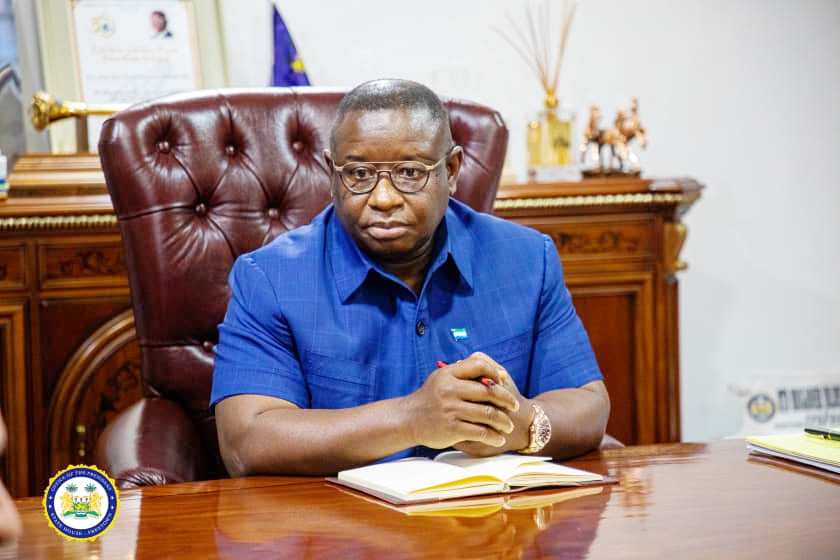Political pundits have informed Nightwatch that President Julius Maada Bio’s chances of winning the June 2023 general elections rest in Kambia and Kono districts.
They said in 31 March 2018 presidential run-off election was an amazingly close race. The result left the All People’s Congress (APC) quite humbled when Julius Maada Bio of the Sierra Leone People’s Party (SLPP) emerged victorious with 51.8 per cent of the votes. His rival, Dr Samura Kamara of the All People’s Congress (APC) scored 48.2 per cent. Only 92,235 votes separated them.
A switch of 46,118 votes in the other direction would have produced a different result. No other election in Sierra Leone’s history has been this close, except according to them the 1967 election, which was conducted under a parliamentary system of government.
How did the APC squander its 21 percentage point margin with the SLPP? And why did such a massive swing occur? The second question can be rephrased as, ‘Why did the APC lose the 2018 election?’
Many say the northern block voting is not ethnic group voting, but still historically informs voting behaviour in the region; whereas in the South and East, apart from Kono, southern block voting seems to be the rule.
The vote shares of the APC and SLPP in the last three elections reflected this ethno-regional divide. In 2012, for instance, the APC received 80 per cent of its votes from the North and Western Area, and the SLPP got 76 per cent of its votes from the South and East.
In the case of the APC, for instance, prior to 2018, the strategy was to maximise its votes in the North and Western Area and penetrate Kono, which is the only swing district in the East.
For the SLPP, the strategy has been to maximise its votes in the South-East and make inroads in Kambia and Koinadugu in the Northern districts with substantial minority group presence.
Former Ernest Koroma needed a four-region strategy to avoid a run-off in 2012. He could not have won on the first ballot by relying only on the North, Western Area and Kono. He needed the votes of all four regions to get to the 55 per cent victory score.
However, because of the lopsided nature of the electorate in ethno-regional terms in 2012, Koroma could have won a second-round ballot (which requires only 50 per cent+1 vote) with only the 51.6 per cent of the votes he received from the North, Western Area and Kono. This is a three-region strategy.
The 2018 results indicate that because of the lopsided distribution of registered voters in favour of the North-Western Area, Bio needed a four-region strategy to win the election in the second round of voting.
How else can one explain the sacking of Sam Sumana an elected Vice President from Kono, and the alienation of the Kono electorate? Or the failure to choose a standard bearer or running mate from the South-East, even though a Southerner, Victor Foh, was Vice President?
The key to the SLPP’s victory was the maximisation of its votes in the southeast districts of Kailahun, Kenema, Bo, Pujehun, Bonthe, and to some extent, Moyamba. Debates on Sierra Leone’s electoral politics have often focused on the phenomena of strongholds and swing districts to determine the winning chances of parties.
The swing districts are assumed to be the Western Area districts and Kono district, with the idea that these districts have changed winning parties a few times in our last five party competitive elections. The notion of swing districts gave rise to the view that no party can win an election without winning Kono.
The SLPP’s victory in 2018 without winning Freetown or the Western Area indicates that the idea of swing districts is unhelpful in understanding electoral politics in Sierra Leone. The only district that flipped in 2018 was Kono (and Kambia in the first round, which gave a plurality of its votes to the NGC). However, changes in vote shares in ethno-regional strongholds are what accounted for the election outcome.
The APC tried many tricks to discredit the top management of NEC, especially its chairman, N’fa Alie Conteh; sought an injunction on the run-off; and accused the international observers, especially those from the European Union, the Commonwealth headed by Ghana’s ex-President John Mahama, and the British High Commissioner of orchestrating regime change.
President Bio was forced to play rogue by calling for nation-wide protests if the elections were not held on the day they were scheduled before the injunction was granted, and asserted that he would stop to recognise Koroma’s legitimacy after 27 March.
The party’s disrespect for institutions includes the illegal sacking of the elected Vice President, Sam Sumana; selectively using the dual citizenship law to witch-hunt Kandeh Yumkella of the NGC, while simultaneously having a large number of ministers who are dual citizens; attempting at the 11th hour of the last Parliament and in the middle of an election to change, without public debate, a constitutional rule that 55 per cent votes are required to avoid a run-off in a presidential election; and elevating political parties over citizens’ democratic choices in determining when presidents and vice presidents can remain in office.


